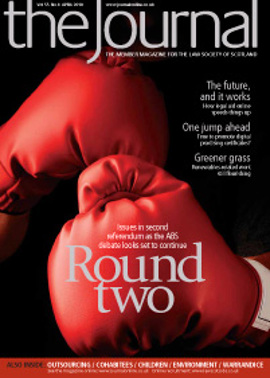Scottish Solicitors' Discipline Tribunal

Section 42A appeal – Malcolm Keith Macaulay Cameron
An appeal was made by Malcolm Keith MacAulay Cameron, solicitor, Glasgow (“the appellant”) against a finding of inadequate professional service by the Council of the Law Society of Scotland in relation to Mr M (“the lay complainer”), and a direction that the appellant should pay the sum of £650 by way of compensation to Mr M. The Tribunal quashed the said determination and direction.
In relation to head of complaint 4 [failure to return phone calls made approximately every two weeks from June 2005 onwards] the Tribunal considered that this head of complaint was specific enough to allow the matter to be responded to and noted that both the appellant and the lay complainer were able to send in comments to the Society. The Tribunal therefore found no merit in the submission that the complaint was so lacking in specification that it was unfair to expect the appellant to respond to it. However, in relation to that complaint the Tribunal found that the Society received information from two sources after the reporter’s report was finalised and intimated to the parties. The Tribunal noted that there was nothing in the client relations committee’s decision as to how this contrary position was reconciled with the wording of head of complaint 4 to enable the Society to make the decision that it did. The Tribunal considered that for that reason the decision was flawed.
In relation to head of complaint 5 the Tribunal considered that, in the particular circumstances of the case and without intending this to be regarded as a general authority, as the appellant had retired from practice and the promise to deliver the file postdated his retrial, there was a sufficient time period in the case between the cessation of the solicitor-client relationship and the breach of promise for the failure not to amount to an inadequate professional service. However, the Tribunal considered that such a failure could amount to a conduct matter. The Tribunal quashed the determination and direction of the Society in relation to both heads of complaint. The Tribunal made no findings of expenses due to or by either party.
The appellant lodged an appeal against the Tribunal decision on expenses to the Court of Session.
On 15 December 2009 the appeal was refused.
David Baird Macadam
A complaint was made by the Council of the Law Society of Scotland against David Baird Macadam, solicitor, Edinburgh (“the respondent”). The Tribunal repelled the respondent’s first plea in law in relation to competence, repelled the second plea in law in relation to the relevance of the averments of the conduct of the respondent prior to the date of his entry to the profession; sustained the third plea in law in relation to specification; and dismissed the remainder of the complaint in respect of articles 9 and 11.1(ii).
The respondent had lodged preliminary pleas and a debate took place in respect of these pleas. The respondent argued that where it was suggested that conduct prior to becoming a member of a relevant professional body could retrospectively be characterised as conduct amounting to professional misconduct, clear words were required in statute to permit such a conclusion. The Tribunal did not feel constrained to interpret the statement “professional misconduct” relative to the period of time in the profession, preferring the interpretation that it is merely descriptive of the type of conduct that will result in the powers contained in s 53(2) of the Solicitors (Scotland) Act 1980 being exercised. The Tribunal however upheld the respondent’s preliminary plea relating to specification as the Tribunal considered that the crucial averment in the complaint of “being in control of the bank account” was entirely lacking in specification. The Tribunal also considered that the other averments were irrelevant as they gave no indication of the inferences which the Society intended to draw from them. The Tribunal considered that whatever was then left in the complaint, even if proved, could not result in a finding of “having knowledge of the embezzlement scheme he permitted it to continue by turning a blind eye”, that finding requiring to be proved to the standard of beyond reasonable doubt. The Tribunal accordingly deleted the averments in the complaint other than articles 9 and 11.1(ii).
The Society decided not to proceed with the remainder of the complaint and accordingly the remaining averments were dismissed.
Michael Gerald Rourke and John Knox Aitken
A complaint was made by the Council of the Law Society of Scotland against Michael Gerald Rourke (“the first respondent”) and John Knox Aitken (“the second respondent”), solicitors, of Robert Thomas & Caplan Solicitors, 365 Victoria Road, Glasgow. The Tribunal found the respondents guilty of professional misconduct in respect of their repeated and numerous breaches of the Solicitors (Scotland) Accounts, Accounts Certificate, Professional Practice and Guarantee Fund Rules 2001 and the Solicitors (Scotland) Practice Rules 1986, their failure to protect the interests of lending institutions to their clients and the interests of their clients by delaying unreasonably to present for registration conveyancing deeds in relation to transactions, and their failure to protect the interests of the lending institutions on whose behalf they were acting by drawing their attention to unusual occurrences in the conveyancing transactions in which they were instructed.
The Tribunal censured the respondents, fined them in the sum of £5,000 each and directed in terms of s 53(5) of the Solicitors (Scotland) Act 1980 that any practising certificate held or issued to the first respondent or the second respondent shall be subject to such restriction as will limit him to acting as a qualified assistant to and to being supervised by such employer or successive employers as may be approved by the Council or the Practising Certificate Committee of the Law Society of Scotland and that for an aggregate period of at least five years with effect from 1 March 2009.
The Tribunal considered the matters in the complaint to be extremely serious. Between February 2004 and June 2007 there were seven inspections of the respondents’ books and two Guarantee Fund interviews. One hundred and two breaches of the Accounts Rules were identified. The Accounts Rules are in place to ensure that when solicitors are dealing with clients’ money, clients’ interests are protected. In this case there were frequent and repeated breaches of the Accounts Rules. The Tribunal was very concerned that despite matters being raised at one inspection, further breaches of the Accounts Rules were raised at the following inspection and this continued for a period of just over three years in connection with seven inspections. The Tribunal was further concerned by the fact that there appeared to have been another inspection in July 2008 and there was no confirmation to the Tribunal that the respondents had sorted matters out to the satisfaction of the Society.
The Tribunal considered that the respondents’ non-compliance with the Accounts Rules after repeated opportunities to correct matters was totally unacceptable. The Tribunal also considered that the respondents seemed to be unaware of the seriousness of the situation in which they found themselves. They did not seem to appreciate the importance of complying with the Accounts Rules or dealing with the issues raised by the inspections of their professional body. The Tribunal accordingly considered that in order to protect the public it was necessary to impose restrictions on the respondents’ practising certificates. The Tribunal noted that the first respondent was the cashroom partner, but given the fact that it was a two partner firm and that both respondents accepted joint responsibility, the Tribunal was of the opinion that the penalty should be the same for both respondents. The Tribunal accordingly restricted both respondents’ practising certificates for an aggregate period of five years to ensure that they work under supervision for a five year period. Given the longrunning failure to address the issues, the Tribunal also imposed a fine of £5,000 on each respondent. Given that the respondents would require time to dispose of their business and make such arrangements as were necessary to transfer their clients’ business as required, the Tribunal ordered that the restriction run from 1 March 2009.
Lynne Helen Craig or Sim
A complaint was made by the Council of the Law Society of Scotland against Lynne Helen Craig or Sim, solicitor, Glasgow (“the respondent”). The Tribunal found the respondent guilty of professional misconduct in respect of her misappropriation of clients’ funds totalling £16,956.84, her payment of these funds to other client accounts, her falsification of accounting entries to disguise her dishonesty, her misleading of clients and her breach of rule 6(1) of the Solicitors (Scotland) Accounts, etc, Rules 2001. The Tribunal suspended the respondent from practice as a solicitor for a period of 10 years.
The Tribunal noted that the respondent had not lodged answers or attended the Tribunal hearing. The Tribunal was satisfied beyond reasonable doubt on the basis of the productions and affidavit evidence lodged that the respondent had misappropriated clients’ funds, paid clients’ funds into other clients’ accounts, had falsified accounting entries to disguise her dishonesty and had breached rule 6(1) of the Solicitors (Scotland) Accounts, etc, Rules 2001. The Tribunal noted that this was a case involving fraud and considered that such dishonest behaviour strikes at the very heart of the duty of every solicitor to be honest, open and accountable when holding money on behalf of clients. However, the Tribunal noted that there had been no personal gain in this case and that the fraud had been perpetrated in an opportunist manner during a relatively short period of time when the respondent was under a great deal of work pressure. In addition, the Tribunal took into account the respondent’s previous unblemished record and the fact that the money had been paid back immediately with no loss to clients or the firm. For these reasons the Tribunal considered that it was not necessary to strike the respondent off the Roll of Solicitors. The Tribunal took the view that the public interest would be adequately protected by suspending the respondent from practising as a solicitor for a lengthy period and imposed a suspension of 10 years.
In this issue
- Islamic law - the beginnings
- Depriving criminals of their ill-gotten gains: is it happening?
- Burdening the legal aid lawyer
- Landlord's hypothec: the permutations
- Time to push for Gill
- Plus ça change, plus c'est la même chose
- Seconds out
- Help at hand
- Win-win situation
- Giving and taking away
- Home and away
- Quest for power
- A crumbling monument?
- No happy ending
- Seminars target money laundering awareness
- DP/FOI specialism opens to applicants
- Law reform update
- Points of access
- Diploma or not?
- From the Brussels Office
- Are you who you say you are?
- Ask Ash
- Social media: a revolution
- A commercial approach
- Growth industry
- Price of success
- Variations: some more thoughts
- Tenancy or bust
- Another nibble of the cherry
- Planning with add-ons
- Website review
- Scottish Solicitors' Discipline Tribunal
- Book reviews
- It's never too early to call your external solicitor?
- Dereliction of duty?
- To grant or not to grant?






